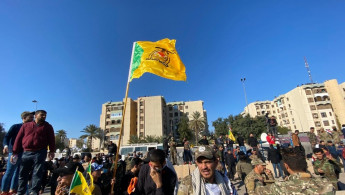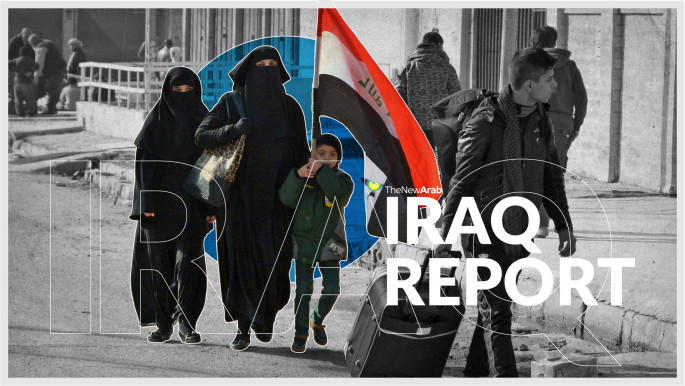The Iraq Report: Pro-Iran militias reassert dominance over Mustafa al-Kadhimi
Following last week's standoff between Iraq's elite Counter Terrorism Service (CTS) and members of the Iran-backed Kataib Hezbollah Shia militia, Iran's proxies have dealt a humiliating blow to Iraq's newly incumbent Prime Minister Mustafa al-Kadhimi, who has now exposed the limits of his power and reach.
The militias not only had their men released, but during their time in custody they were held by their own forces, demonstrating amply the weakness of the federal government in controlling violence within its own borders.
Kadhimi will now be at the mercy of parliamentarians and perhaps even a pledge of assistance and support from the United States. With the second round of a strategic dialogue between the US and Iraq due to take place in the coming month, Kadhimi's political success will depend heavily on balancing domestic forces loyal to Iran with external support from the United States.
Without Washington's help, Kadhimi may find himself soon out of a job or else doing the bidding of Tehran just to stay at least nominally in power.
Kadhimi cannot stand up to Iran's militias
Prime Minister Mustafa al-Kadhimi was forced to release more than a dozen members of the powerful pro-Iran Shia militia Kataib Hezbollah days after he ordered their arrest, demonstrating the minimal and ineffectual extent of his power.
 |
Mustafa al-Kadhimi's political success will depend heavily on balancing domestic forces loyal to Iran with external support from the United States |  |
Kadhimi deployed members of the elite Counter Terrorism Service (CTS) to detain the Kataib Hezbollah operatives early last Friday after intelligence had been received that they were planning yet another rocket attack against US targets from Dora, south of the capital Baghdad.
The CTS swiftly moved in on the militants, arresting 14 men and seizing munitions and rocket launchpads designed to be fired from mobile platforms. Kataib Hezbollah responded by mobilising 150 militants and drove on the fortified Green Zone without challenge from the federal police or the army, making a show of strength outside the prime minister's official residence.
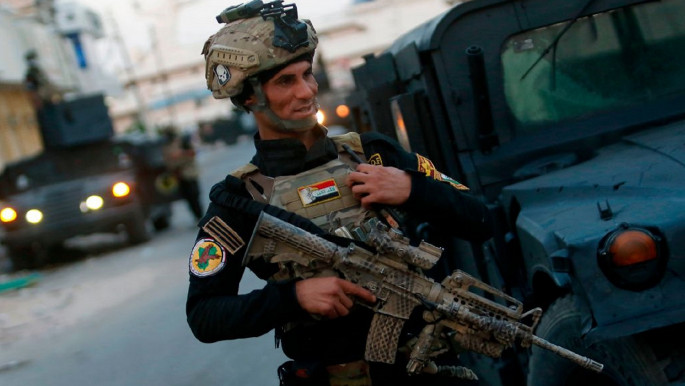 |
|
| The Iraq Report: Showdown with Iran-backed militias in Baghdad tests Mustafa al-Kadhimi's government |
The arrested men were then transferred to the custody security directorate of the Popular Mobilisation Forces (PMF), an Iran-backed paramilitary umbrella organisation that Kataib Hezbollah are one of the main constituent factions of.
On Monday, the Shia militants were released "due to a lack of evidence" despite the seizure of rockets and other munitions. They promptly proceeded to burn Israeli and American flags, and to step on photographs of Kadhimi, a grave insult in the Arab world, particularly as he is, nominally at least, their commander-in-chief.
The PMF are a formal branch of the Iraqi armed forces and are technically under Kadhimi's command and answerable to him. In reality, however, they primarily operate within their own chains of command that see them answer to militant leaders such as Abu Fadak, Qais al-Khazali, and Hadi al-Amiri, all of whom ultimately have close ties and bonds to Iran's Islamic Revolutionary Guard Corps (IRGC).
Essentially, one branch of the Iraqi military, the CTS, arrested a constituent member of another branch of the military, the PMF, before releasing the suspects into the custody of the group they had just targeted. The PMF effectively held and then released their own men, leading to the appearance that the entire operation was an elaborate charade.
 |
Kadhimi was forced to release more than a dozen members of the powerful Kataib Hezbollah militia days after he ordered their arrest, demonstrating the minimal and ineffectual extent of his power |  |
The New Arab's Iraq Report last week posited that these events were likely coordinated with Iranian acquiescence in order to improve Kadhimi's standing with the United States. This would in turn keep Iraq from being drawn into Washington's "maximum pressure" sanctions regime against Iran, and Tehran is heavily reliant on Baghdad as a conduit to circumvent sanctions.
This analysis has now been supported by international think tanks who suggest that Kadhimi's position vis-à-vis the Trump administration may now be improved but at the cost of the Iraqi prime minister demonstrating his inability to effectively deal with the Iranian militias.
Ranj Alaadin, visiting fellow at Brookings Institution in Doha, argued in an analysis published Wednesday that it was likely that Iran was involved in some way or another, suggesting that it was highly unlikely that Tehran was caught unawares by Kadhimi's move.
Again, and as The New Arab reported last week, it is highly improbable that Kadhimi would make unilateral moves without either Iran's acquiescence or American assent and support. His premiership is the result of a compromise between these two foreign powers, he did not win an election, and he does not have a popular mandate.
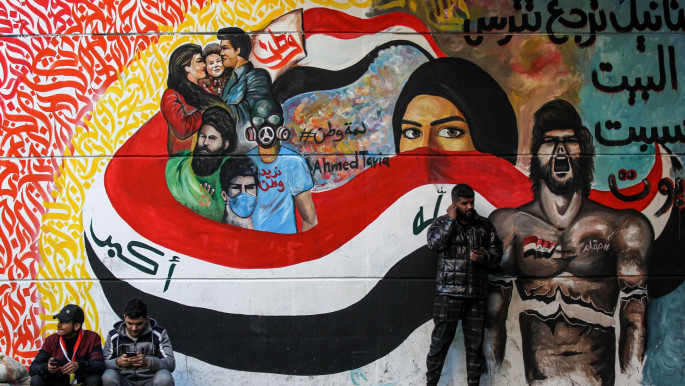 |
|
| The Iraq Report: Mustafa al-Kadhimi takes the helm in stormy political waters |
Kadhimi's position is therefore increasingly precarious and he has now shown that he is too weak to do anything about Iran's proxies who regularly target American troops and dominate Iraq's security and political scene.
If Kadhimi moves too powerfully against Iranian interests, the Iraqi parliament who voted him in and which is dominated by lawmakers intimately linked to Tehran will simply call a vote of no confidence and his career as prime minister will end as rapidly as it began.
US assistance vital for beleaguered PM
If Kadhimi is serious about tackling the militias, then his one chance in the short term is to exploit Tehran's own turmoil as a result of US sanctions and the coronavirus that has wreaked havoc in Iran and made the country into a regional epicentre.
Reuters has reported that these twin crises have halved Iran's financial support to its Shia Islamist proxies, to between $2 to $3 million dollars a month from approximately $5 million. Kadhimi could choose to use this financial shortfall to tempt militiamen away with better pay working for military units that are more integrated into the formal chain of command.
 |
If Kadhimi is serious about tackling the militias, then his one chance in the short term is to exploit Tehran's own turmoil as a result of US sanctions and the coronavirus |  |
This would lead to a weakening of the Shia militias as they lose men to better paying jobs that also have clear career progression in terms of progressing through the ranks of the security services, historically one of Iraq's main employers going back to post-revolutionary Iraq in 1958.
However, considering Iraq's own financial crisis and its near-empty coffers, it is unlikely he will be able to do this without US support. The second stage of the US-Iraqi strategic dialogue could therefore be crucial to the longevity and efficacy of his premiership.
A significant cash injection would not only prop up the ailing government but such funds could be earmarked for the Iraqi security forces to bring the traditional arms' fighting power to a level in excess of Iran-backed militias who can currently go toe-to-toe with Iraq's conventional forces and even defeat them, much as the Iran-sponsored Lebanese Hezbollah could arguably cause immense damage to the Lebanese armed forces.
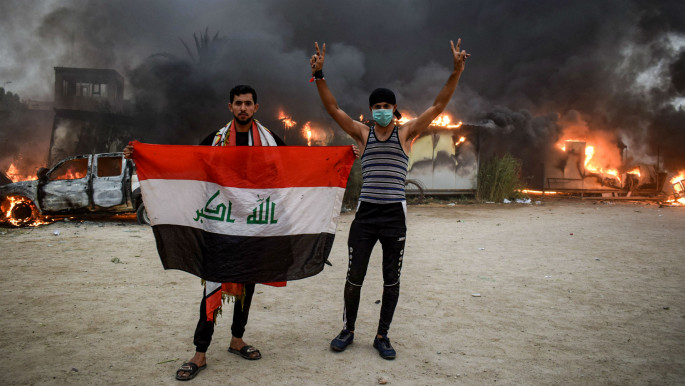 |
|
| The Iraq Report: Mustafa al-Kadhimi takes aim at pro-Iran militias |
Washington may be hesitant to commit to such a course of action, however. Recent experience since the US-led invasion of 2003 has shown how American weapons and funds meant to support Iraq's reconstituted armed forces were frequently taken by Shia militants.
This was especially apparent in the war against the Islamic State (IS) group between 2014 and 2017. The Iraqi government received heavy weapons and military hardware from the United States only to turn them over to Tehran-backed militias who were perpetrating gross human rights violations.
Washington will undoubtedly want reassurances that this will not happen again. After all, the PMF contains factions such as Kataib Hezbollah that are designated terrorist organisations by the US.
The PMF currently draws part of its funding from the Iraqi defence budget and, as a formal branch of the military, they are also partially stocked by the national armoury which contains much in the way of American military hardware.
Clearly, the thought of American arms falling into the hands of Shia Islamists who are not only loyal to Iran and operate outside of the Iraqi chain of command but who are also considered to be terrorists is deeply unpalatable to Washington.
It remains to be seen whether the Trump administration will extend an assisting hand to prime minister Kadhimi, particularly as he has shown that he is incapable of detaining militants who actively target American military personnel and assets.
However, the White House is desperately short of friends in Iraq, so while it may not be certain of Kadhimi's chances in balancing against Iran, it will also be loath to completely abandon the field to the Iranians who have been ascendant in Iraq since 2003 and have since used it as a springboard to expand their influence all the way to the Mediterranean Sea.
